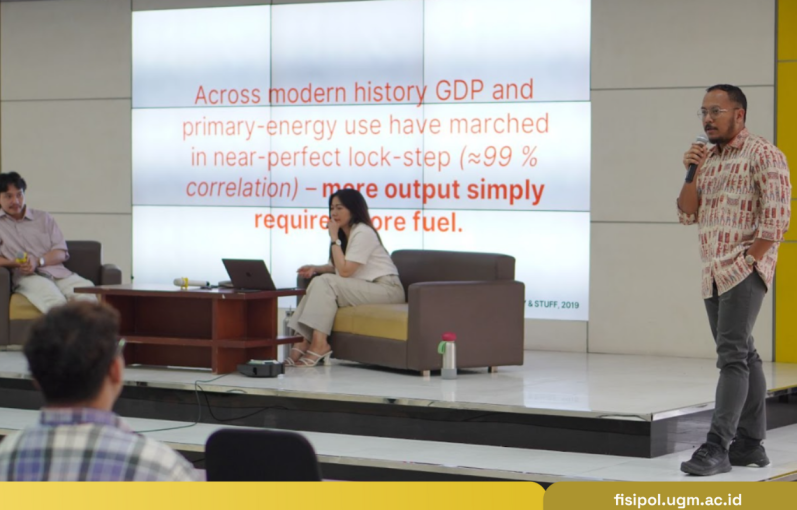
Yogyakarta, April 28, 2025–The energy transition and decarbonization agenda in Indonesia is mostly dominated by a techno-economic analysis. According to Indri Dwi Apriliyanti, a lecturer from UGM’s Department of Public Policy and Management, this method of analysis is not enough in responding to the complexities of decarbonisation, which involves socio-political aspects.
“Countries which are reliant on the coal industry have more difficulties in reaching the decarbonization target,” Indri mentioned in a public lecture titled “Unlocking the Climate Future: What Keeps Us from Climate Action” on Monday (28/4) at the Fisipol UGM Auditorium. This public lecture was organized by UGM’s Department of Public Policy and Management in collaboration with the Deutsche Gesellschaft für Internationale Zusammenarbeit (GIZ).
According to the research conducted by Ms. Indri and GIZ, almost all politicians in Indonesia thought that the main objective of policies, as well as government programmes aimed at energy transition has something to do with economic growth and industrial development. Decarbonization instead became the secondary goal. This is in line with the research findings related to lock-ins in the government sector. First, there is both interest and dependency towards the coal industry that is strongly rooted in the Indonesian government. Second, there is a lack of political will due to the government prioritizing the economy much more. Third, the lack of coordination between sectors of government causes programmes, regulations, and policies to collide with each other, instead of complementing one another. Furthermore, the research findings also suggest that the stakeholders, such as industries, civil society organizations, as well as non-governmental organizations have already realized the urgency of decarbonization. However, the image that they currently have is still limited, influenced by market demands, and is reliant on government incentives.
On the other hand, Yudiandra Yuwono, as Implementing Manager for PACT GIZ Indonesia ASEAN, said that the primary energy consumption of a country is always linear with its economic growth. By complying with the economic growth set by the government, energy consumption will also be projected to always rise. Although the government has targeted a renewable energy mix of 70% by 2045, Yudiandra emphasized on the fact that renewable energy still requires the state to do natural resource and land extraction, as well as payment through the loan mechanism.
“Unfortunately, our hope for welfare relies on a natural resource that is diminishing as we speak. Efforts to gain these natural resources will need more energy, water, effort, and cost compared to today,” Yudiandra argued.
As a response, Yudiandra emphasized on the importance of applying a perspective which does not solely focus on economic and technological growth. Instead, development should be guided by the more meaningful end goal. This, of course, demands the shift in values which prioritized economic productivity as the main indicator of successful development. Without collective change, the agenda of energy transition and decarbonization risks itself to be just a symbolic agenda that does not seek to solve the root of the problem.
“Countries which are reliant on the coal industry have more difficulties in reaching the decarbonization target,” Indri mentioned in a public lecture titled “Unlocking the Climate Future: What Keeps Us from Climate Action” on Monday (28/4) at the Fisipol UGM Auditorium. This public lecture was organized by UGM’s Department of Public Policy and Management in collaboration with the Deutsche Gesellschaft für Internationale Zusammenarbeit (GIZ).
According to the research conducted by Ms. Indri and GIZ, almost all politicians in Indonesia thought that the main objective of policies, as well as government programmes aimed at energy transition has something to do with economic growth and industrial development. Decarbonization instead became the secondary goal. This is in line with the research findings related to lock-ins in the government sector. First, there is both interest and dependency towards the coal industry that is strongly rooted in the Indonesian government. Second, there is a lack of political will due to the government prioritizing the economy much more. Third, the lack of coordination between sectors of government causes programmes, regulations, and policies to collide with each other, instead of complementing one another. Furthermore, the research findings also suggest that the stakeholders, such as industries, civil society organizations, as well as non-governmental organizations have already realized the urgency of decarbonization. However, the image that they currently have is still limited, influenced by market demands, and is reliant on government incentives.
On the other hand, Yudiandra Yuwono, as Implementing Manager for PACT GIZ Indonesia ASEAN, said that the primary energy consumption of a country is always linear with its economic growth. By complying with the economic growth set by the government, energy consumption will also be projected to always rise. Although the government has targeted a renewable energy mix of 70% by 2045, Yudiandra emphasized on the fact that renewable energy still requires the state to do natural resource and land extraction, as well as payment through the loan mechanism.
“Unfortunately, our hope for welfare relies on a natural resource that is diminishing as we speak. Efforts to gain these natural resources will need more energy, water, effort, and cost compared to today,” Yudiandra argued.
As a response, Yudiandra emphasized on the importance of applying a perspective which does not solely focus on economic and technological growth. Instead, development should be guided by the more meaningful end goal. This, of course, demands the shift in values which prioritized economic productivity as the main indicator of successful development. Without collective change, the agenda of energy transition and decarbonization risks itself to be just a symbolic agenda that does not seek to solve the root of the problem.
